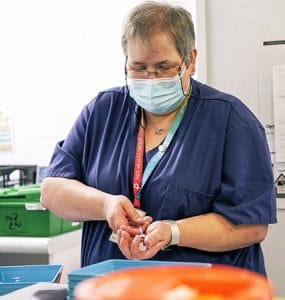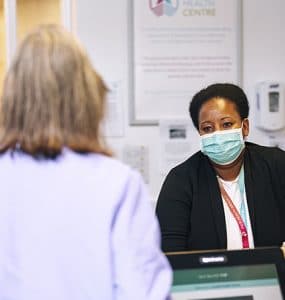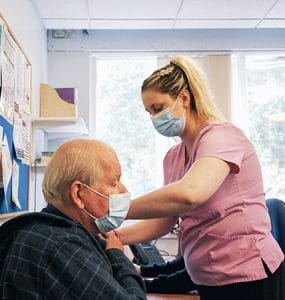Meet your GP team
Your general practice team can now offer you more specialist services than ever. That’s because these teams include a variety of highly trained medical professionals, who each bring extensive, specialist knowledge to local care.
These GP-led teams include roles like advanced nurse practitioners, physiotherapists, and clinical pharmacists.
These roles are embedded within a GP practice team. All staff liaise with each other effectively to deliver holistic care. Read on to learn more about who may make up your local GP team.
Advanced Nurse Practitioners
Advanced nurse practitioners are trained to help with diagnosis and initiate treatment plans, including prescribing, particularly when it comes to acute and chronic conditions.
An advanced nurse practitioner can do many things that were previously done only by a GP. These include taking a person’s medical history; conducting physical examinations; ordering further investigations; and prescribing medicines.
Practice Nurses
Practice nurses are registered nurses. They are involved in many aspects of your care during the course of your life, from family planning advice and childhood immunisations, to blood samples and managing long-term conditions.
Mental health nurses
Mental health nurses in the GP team promote and support a person’s recovery when they have mental health problems or are living with a psychological condition.
These nurses work with the person, their families and carers, to help them live independent and fulfilling lives. They will advise patients on things like relevant therapies, taking medication correctly and suggest different treatments, such as activities or support groups.
Nursing associates
Nursing associate is a new role in the practice nursing team. They sit between healthcare assistants and registered nurses.
Healthcare Assistants
Healthcare assistants are a key part of the practice multidisciplinary team. They support the practice nursing team in delivering treatment, preventative care, health promotion and patient education.
They are often trained in wound care and managing chronic diseases.
Physiotherapists
Physiotherapists are clinical practitioners who can assess, diagnose, treat, and manage musculoskeletal (MSK) problems caused by injury, illness or disability.
If you’re experiencing joint or muscular pain, you can now consult a physiotherapist directly at your local GP practice, without needing to be referred by the GP.
Faster access to a physiotherapist means faster diagnosis and treatment. This enables you to manage your condition more effectively and helps you to get back to normal life more quickly.
Clinical pharmacists
Clinical pharmacists assess and treat patients, using expert knowledge of medicines for specific disease areas.
They care for patients with chronic illnesses and carry out clinical medication reviews to manage people with complex medication needs, especially the elderly, people in care homes and those with multiple conditions.
Community paramedics
Community paramedics can quickly recognise and manage patients whose conditions are rapidly deteriorating. They can also care for those with long term conditions, minor injuries, and minor illness.
They can provide urgent assistance through telephone triage and home visits to treat wounds, certain infections and other minor injuries and illnesses.
Many can also administer certain types of medicine directly to patients, including pain killers, without the need for a prescription.
Social prescribers
Social prescribing enables care professionals to direct people to an extensive range of local services to help their physical health and mental wellbeing.
These services and activities, although not medical, allow people to take greater control of their own health. Some examples are group classes, arts activities, healthy eating advice and support joining in with sports.
Social prescribers, also known as ‘link workers’, refer patients to services relevant for their needs. Anyone working in the GP team can refer a patient to a link worker.
Practice managers
Practice managers are vital to the smooth running of your local GP team’s services. They look after things like finance, business planning, administration, and non-clinical staff management.
Receptionists
Receptionists will be the first people you speak to at your GP practice, and your care begins the moment they answer your call. Receptionists will ask you a few quick, confidential questions, so they can guide you to the right care. Their job is to make sure you get care from the right health professional.



